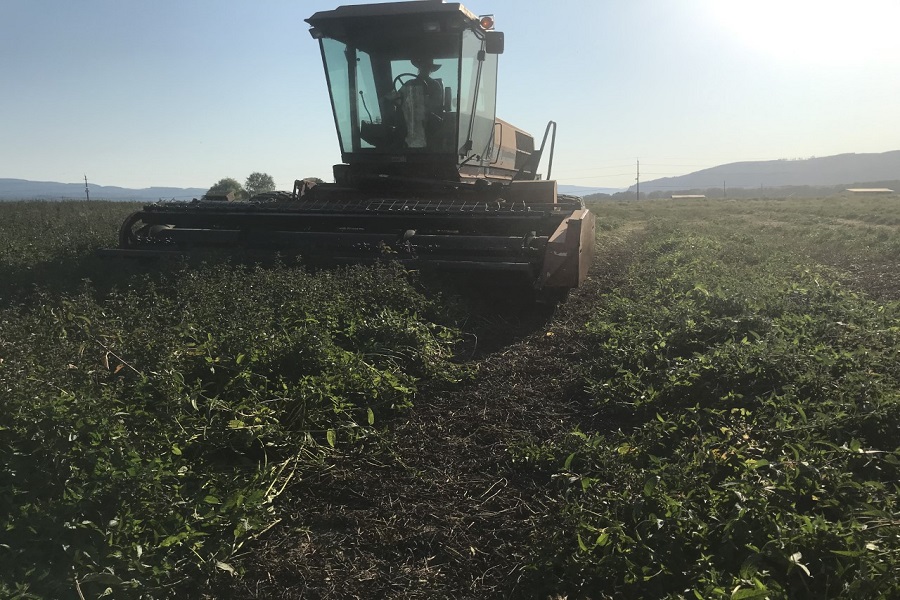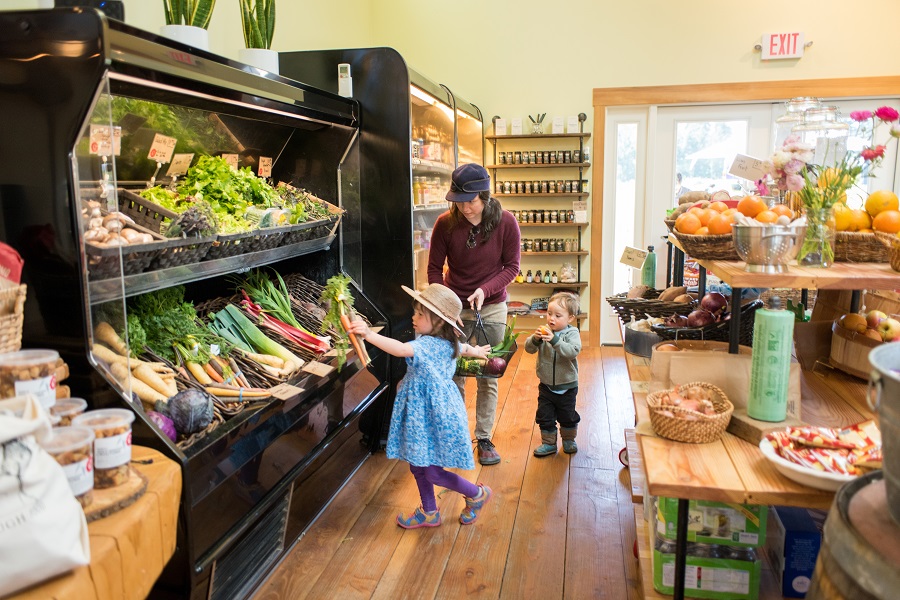Family farms turn to e-commere to stay afloat.
For Mike Seely, owner of third generation-owned Seely Mint Farm in Clatskanie, the COVID-19 pandemic has been a roller coaster, both emotionally and financially. Sales were rising quickly before the onset of the pandemic. Seely and his wife Candy had spent the past few years expanding the business, and their hard work had begun to pay off.
The farm had entered a partnership with fast food chain Burgerville, which used the farm’s mint in its milkshakes. Mint patties made by Candy Seely had become successes at checkout stands, leading more customers to try and buy their mint and peppermint, as well as other value-added products.
But the onset of COVID-19 meant a decline of checkout counter purchases. During the initial months of COVID-19, candy sales evaporated.

Mint harvested at Seely’s Mint Farm. Credit: Mike Seely
In addition to rapid consolidation in the agricultural sector, family-owned farms have faced a string of unexpected pandemic challenges. While grocery store sales have remained robust, the pandemic has eaten away at restaurant sales, farm visits, education programs, farmers market sales and value-added products.
With a winter surge of the virus around the corner, small farms have had to find new ways to stay nimble and rely on local partnerships to weather the storm.
The pandemic held a personal tragedy for Mike Seely, who lost his mother to the virus. Support came in the form of Built Oregon, a nonprofit dedicated to growing and innovating Oregon brands. The organization helped Seely come up with an e-commerce strategy and make connections to get his product into more online stores.

Mint trucks load up at Seely’s Farm. Credit: Mike Seely
Fast food sales remained steady and revenue from mint milkshakes were able to keep the farm afloat.
“Burgerville was a real life-saver for us,” says Seely.
Sales of mint, mint oil and minty desserts spike around the winter holidays and COVID-19 has not impacted that. In the coming months, Seely Mint Farm products will be on the shelves and online at Whole Foods. For now, the farm is on track for a big year in 2021.
“We’ve fully recovered because of the holidays,” says Seely. “Our next goal is to build out our facility. Eventually we want to do something similar to what Tillamook Cheese does, giving guided tours. Obviously that can’t happen for a while, but right now things are going great. I can’t complain.”
For Narendra Varma, who owns and operates Our Table Cooperative in Sherwood, the pandemic has meant many revenue sources have dried up. The cooperative operates on a multifront model, giving farm tours and classes, operating a grocery store, as well as selling produce to restaurants and other grocers.
During the onset of COVID-19, the cooperative model meant the company was able to avoid some of the initial shock.

Customers shop at Our Table Cooperative. Credit: Our Table Cooperative
“At the start of the pandemic, many of the big chain grocery stores were dealing with shortages. We didn’t. Our supply lines are much shorter because we source here in Oregon. We were smaller and able to be more nimble,” says Varma.
But as time wore on, the pandemic hit the business on multiple fronts. The cooperative model is meant to offer farmers more avenues of sale than conventional farming but many of those channels have been closed off due to the pandemic.
“Our restaurant partners were dropping like flies all around us. To be honest, we’re up against the ropes a little,” says Varma.
Another issue for the cooperative is the number of customers unwilling to wear masks. Varma has transitioned the cooperative store to pick-up only to safeguard employees from confrontations with customers not wearing protective gear.
“People have gotten belligerent and violent, and it’s unfortunate how people have politicized the mask wearing. They think it’s all about their freedom, but they don’t think about the freedom of the person standing next to them to work or shop safely.”
The transition to online sales and grocery store pick-up has been less smooth than the couple had anticipated. Sales of the cooperative’s biggest product, blueberries, have seen a 40% drop since the pandemic, as shoppers gravitate more toward essentials when buying groceries online.
“It’s a shame because we had the best blueberries we’ve ever had this year, so we’re freezing a lot of it.”
Many restaurants are surviving the pandemic by transitioning to hybrid models themselves, offering grocery products and pre-prepared family meals. Restaurant sales are slowly picking back up for Our Table Cooperative, but only for bulk products. With the latest surge in COVID-19 cases, Varma says they have seen an increase in orders as more consumers stock up.
“We’re going to weather the storm,” says Varma. “That is until the federal government can stop bickering and get a real stimulus package through. But we are going to limp our way through this. Small businesses are scrappy.”
To subscribe to Oregon Business, click here.









